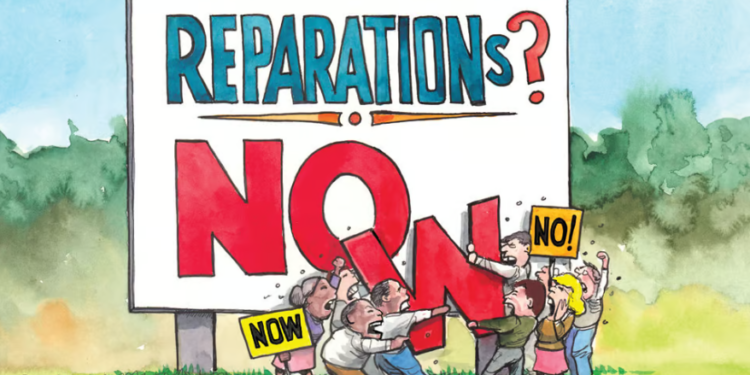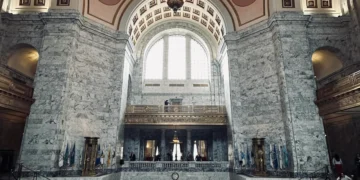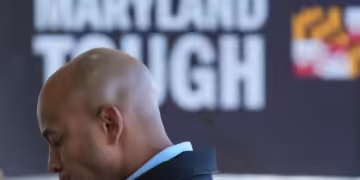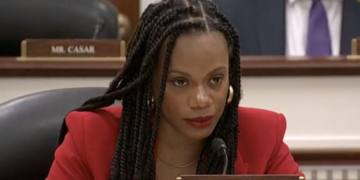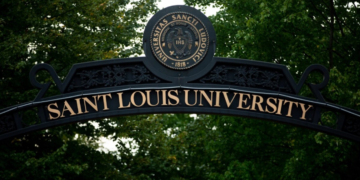Dec 16, 2024 Story by: Editor
In celebration of the fifth anniversary of Evanston’s reparations program, the city’s Reparations Committee hosted a town hall meeting Thursday evening. The event featured discussions from national panelists on the program’s local impact and other reparations initiatives across the country.
Held at the historic Second Baptist Church, Evanston’s first Black Baptist congregation, the event drew approximately 100 attendees, including local residents and visitors attending the 2024 National Symposium for Local and State Reparations. Cook County Circuit Judge Lionel Jean-Baptiste moderated the panel discussion.
Since the reparations program launched five years ago, Evanston has distributed over $5 million to Black residents who lived in the city between 1919 and 1969—a period marked by housing discrimination—and their direct descendants.
A Reflection on Evanston’s History
Judge Jean-Baptiste told the audience, “The harm was state-sponsored, therefore it was correct for the state to remediate.”
Iva Carruthers, a former resident of Evanston’s Fifth Ward and past chair of Northern Illinois University’s Sociology Department, shared her family’s history of fleeing racial violence in the South. Her grandparents moved to Evanston in 1919, with her mother following in 1922. Carruthers described the enduring trauma of racial discrimination, stating, “The transgenerational racial trauma they experienced is deadly and it is real.”
She emphasized that reparations represent a compassionate vision, saying, “We collectively have a particular and unique call to organize around Pan-African principles… towards transforming the world order and the empire.”
Karli Butler, an Evanston resident and director of community leadership at the Evanston Community Foundation, recounted how her grandparents were repeatedly denied housing loans by white-owned banks. A sympathetic white banker intervened to help them secure a loan, but her grandfather passed away at 94 before receiving reparations benefits.
“I wanted my grandfather to get something, like anything, and unfortunately, he didn’t get to see it,” Butler said. “But I was fortunate to be able to go to the city and then have that $25,000 go to his heirs. I feel my grandfather here in this space. I feel like the offering was someone seeing him and validating his experiences.”
Preserving History and Inspiring Change
Nikko Ross, grandson of former City Council Member Delores Holmes, reflected on her legacy of supporting the reparations program. Inspired by her lessons on service, he said, “As long as I have a pulse, I have a purpose. That resonated with me throughout my whole life. The second lesson I learned was to serve humanity with grace and contribute to your community.”
National Movements
Reparations initiatives are also progressing in other cities. Attorney Areva Martin highlighted Palm Springs, California, where Black and Latino residents were displaced in the 1960s for urban development, causing an estimated $2 billion in economic losses. Survivors recently won a $5.9 million settlement with direct cash payments. Martin noted, “This work is possible, and there are inspirations like what happened in Evanston.”
In Tulsa, Oklahoma, City Council Member Vanessa Hall-Harper emphasized the importance of Black organizations and land ownership, adding, “We always have to be working to establish our own institutions for us, by us, so that we can control our futures.”
Joanne M. Braxton, leading the Reparations For Lakeland Now! campaign in Maryland, described the psychological toll of displacement, stating, “Moral injury compounds traumatic distress… these invisible wounds… require repair.”
Honoring Evanston’s Journey
Robin Rue Simmons, chair of the Reparations Committee, closed the event by acknowledging Evanston’s groundbreaking efforts. “I want you to see the community that did this, and I want you to see your own community in us, because this exists wherever you are,” she said.
To honor the city’s reparations journey, the Evanston Public Library is hosting an exhibit through Jan. 21. Source: Evanston Round Table


